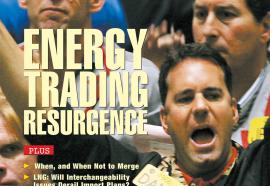People
(January 2007) PNGC Power promoted Tom Haymaker to vice president of power supply. Calpine Corp. announced that Larry B. Leverett joined the company as senior vice president, gas trading. ITC Holdings Corp. announced that William J. Museler has been appointed to its board of directors. Sierra Pacific Resources announced that William D. Rogers has been named to the new position of vice president, finance and risk, and Corporate Treasurer. And others...






